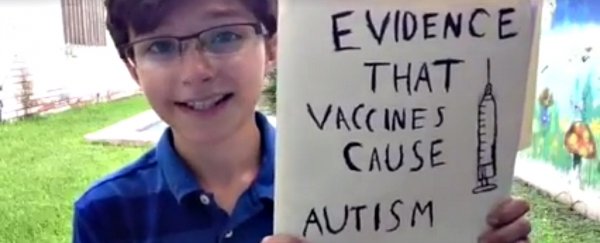Parents in Uganda will face up to six months in jail for failing to vaccinate their children, under a new law signed this month by President Yoweri Museveni.
Children will also be banned from going to school unless they have an up-to-date immunisation card - including all relevant boosters. The somewhat extreme law has been put in place to help stop the spread of deadly diseases such as polio and meningitis in the country. Right now, 70 out of every 1,000 children in Uganda will die before they turn five.
Importantly, the new legislation will also target the leaders of a growing religious cult named 666, who are spreading anti-vacc ideology throughout the country and telling parents not to vaccinate - even going as far as hiding children in slums to avoid immunisation.
"It started in a few districts in eastern Uganda," health minister Sarah Achieng Opendi told the BBC about 666, "but now it has spread and now we are seeing it all over the country."
This isn't the first time legislation has been put in place to encourage parents to vaccinate their children. In Australia, parents lose their childcare and welfare benefits if they refuse to vaccinate their child for anything other than medical reasons, and the state of Victoria has banned un-immunised children from childcare and school altogether.
The state government of California is also looking to do something similar, prompted by a measles outbreak that was triggered by an unvaccinated child at Disneyland in 2014, which ended up infecting hundreds of children - despite the fact that measles had been eliminated in the US since 2000.
But Uganda has gone a little more extreme, with the hopes that the new law will help combat the anti-vacc messaging of the 666 cult leaders, as well as helping to improve childhood survival and immunisation rates. Currently, around 3 percent of children in the country have not been vaccinated.
So why does it matter if some parents choose not to immunise their kids, if everyone else is protected? Well, unfortunately, like pretty much everything in medicine, no vaccine is 100 percent effective, which means that some children will remain vulnerable to the diseases they prevent, even after being immunised.
Very young babies and children with compromised immune systems also can't be vaccinated for health reasons, and it's only by ensuring that everyone around these vulnerable individuals are vaccinated that we can keep them safe. As the Disneyland outbreak made abundantly clear, even one unvaccinated child is enough to bring a vaccine-preventable condition such as measles back into a community.
The Ugandan law was passed on March 10, and there's still not much information out there as to exactly what it entails and who will be exempt. But the one thing that's clear is that the country is certainly not going to be playing nicely with anti-vaccers, or people who put other children at risk by refusing to immunise their kids.
